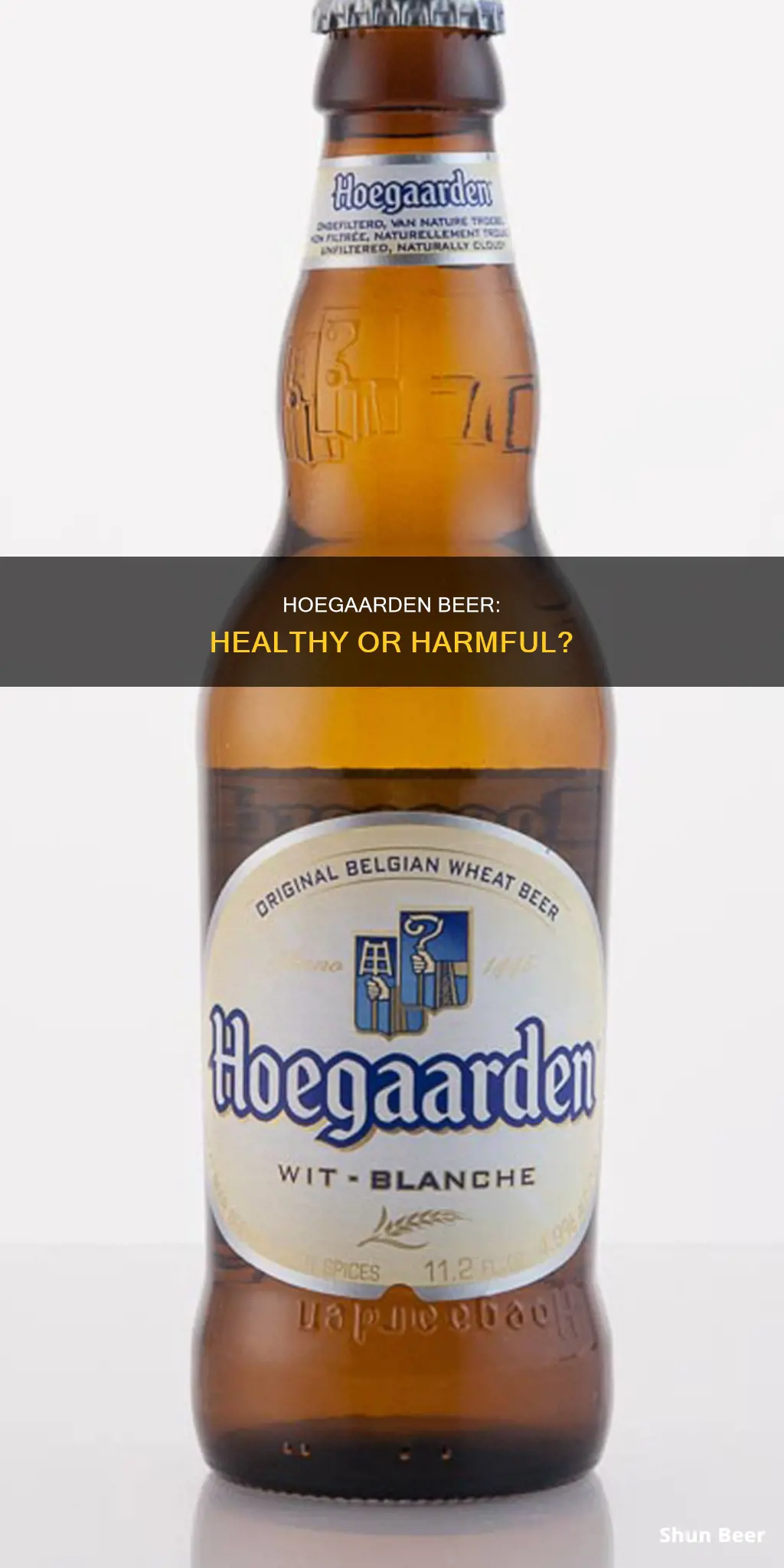
Hoegaarden is a well-known Belgian wheat beer that has sparked interest in its health benefits. With its unique brewing process, including a second fermentation and the use of specific yeast strains, Hoegaarden and other similar Belgian beers have been praised by scientists for their potential positive impact on gut health. The beer's high acidity and probiotic content have been highlighted as beneficial, but moderation is key as excessive alcohol consumption can have negative effects. This raises the question: Is Hoegaarden beer healthy, and if so, what are the specific health benefits associated with consuming it?
What You'll Learn

Hoegaarden is a Belgian wheat beer
Hoegaarden is a fermented beer that is not filtered, which gives it a cloudy appearance and a smooth texture. The beer has a soft, light, and slightly sweet and sour taste, with subtle citrus notes. It is best served in its characteristic hexagonal glass, which helps keep the beer colder for longer.
The brewing process for Hoegaarden is quite complex. The beer is fermented twice, using a different strain of yeast found in traditional pints. This strain of yeast produces acids that kill harmful bacteria in the gut, making Hoegaarden a "very healthy" beer, according to Professor Eric Claassen of Amsterdam University.
Professor Claassen presented his research at an event held by probiotic drink maker Yakult, where he explained that Hoegaarden and other strong Belgian beers are rich in probiotic microbes that offer a range of health benefits. He emphasised that drinking in moderation is key, as alcohol in high concentrations can be detrimental to gut health.
In summary, Hoegaarden Belgian wheat beer is a unique and refreshing beverage with a long history. Its complex brewing process gives it a distinctive flavour and health benefits when consumed in moderation.
Beer and Pregnancy: Is It Safe for Expecting Mothers?
You may want to see also

It is bottle-conditioned
Hoegaarden beer is often praised for its health benefits. It is bottle-conditioned, which is one of the ways brewers carbonate beer. Bottle conditioning is a traditional method that gives beer a finer, silkier texture of carbonation, superior foam retention, more complex flavours, a longer shelf life, and better ageing ability than beers that are force carbonated.
The process of bottle conditioning involves taking advantage of the live yeast still suspended in the beer after fermentation. Brewers add a small amount of sugar to the beer just before sealing it in the bottle. This triggers a small secondary fermentation that produces carbon dioxide and a negligible amount of alcohol. The carbon dioxide is absorbed by the beer, resulting in natural carbonation and a deeper character in the flavours.
The longer a bottle-conditioned beer is allowed to rest during in-bottle fermentation, the better it will be. Some brewers age their beers for a decade or more. Bottle conditioning results in a thin film of dead yeast cells that collect at the bottom of the bottle. These are harmless and, in some beer styles, are a key component of the beer's profile.
Bottle-conditioned beers can be served chilled or warm, depending on the drinker's preference. When pouring, it is recommended to do so slowly and smoothly to avoid disturbing the yeast. It is often best to avoid pouring the last bit of beer from the bottle where the yeast has settled.
Overall, bottle conditioning is a traditional technique that enhances the flavour, ageing ability, and complexity of beer. It is a time-consuming process that requires proper storage and serving techniques, but it can result in a superior beer-drinking experience.
Sour Beers: Health Benefits or Just a Tangy Treat?
You may want to see also

Hoegaarden is not gluten-free
Hoegaarden beer is not gluten-free and must be avoided if you are gluten intolerant or have been diagnosed with any form of Celiac Disease. This is because Hoegaarden contains wheat and barley, which contain gluten. Hoegaarden is a “white bier” spiced with coriander and orange peel. It is unfiltered and has a cloudy appearance. It is also known as “The Original Belgian Wheat Beer”.
Hoegaarden is a strong Belgian beer that is rich in probiotic microbes that offer a range of health benefits. Professor Eric Claassen, who works at Amsterdam University, explained that Hoegaarden and other strong Belgian beers are fermented twice. This second fermentation creates a drier flavour and boosts the strength of the beer. It also uses a different strain of yeast that produces acids that kill harmful bacteria in the gut.
While Hoegaarden may offer some health benefits due to its probiotic content, it is important to consume it in moderation as alcohol can be bad for the gut in high concentrations. Those with gluten intolerance or Celiac Disease should avoid Hoegaarden and other wheat beers altogether.
In addition to wheat and barley, Hoegaarden contains water, yeast, hops, coriander, and dried Curaçao orange peel (Laraha). It has an alcoholic content of 4.9% and a 330ml bottle contains approximately 176-277 calories. While Hoegaarden is not gluten-free, it is vegan-friendly as it does not remove sediment or yeast from its beer.
Non-Alcoholic Beer: Healthy Beverage or Just a Fad?
You may want to see also

It is vegan-friendly
Hoegaarden beer is considered healthy due to the presence of gut-friendly bacteria, which can offer a range of health benefits. The beer is rich in probiotic microbes, which can help to restore the natural balance of bacteria in the gut and reduce bloating and flatulence in IBS sufferers. While alcohol can be harmful to the gut in high concentrations, drinking Hoegaarden in moderation may provide health benefits.
It is also important to note that Hoegaarden is vegan-friendly. The beer does not contain any animal-derived products or ingredients, making it suitable for vegans and vegetarians. The company that produces Hoegaarden, AB-InBev, has confirmed that none of their beers contain animal products or derivatives. In an email from 2013, the company stated that Hoegaarden does not contain any animal ingredients and is not filtered, conserving most of the proteins in the beer. The beer is also not brewed using any process aids such as isinglass or gelatin, which are sometimes used in the brewing process.
The vegan status of Hoegaarden may vary by region, as some sources indicate conflicting reports. However, direct contact with the company confirms that the beer is vegan. The labels on the bottles are attached using "glue" called Eticol 700 and Eticol 419, which are casein-glues based on dairy protein and starch. While there is dairy protein present in the glue, it is worth noting that this does not come into contact with the beer itself.
Hoegaarden is a well-known Belgian wheat beer, recognised for its unique flavour and low alcohol content compared to other Belgian beers. It is unfiltered, which means it retains most of its proteins and has a distinct pouring method that involves swirling the bottle. Hoegaarden is a popular choice for those seeking a vegan-friendly and healthy beer option.
Beer: Healthy Weight Gain or Loss?
You may want to see also

The beer is rich in probiotics
Hoegaarden beer is rich in probiotics, which offer a range of health benefits. Probiotics are live bacteria that are thought to restore the natural balance of bacteria in the gut, especially after periods of illness or antibiotic use, which can irritate the stomach and intestines. The National Health Service (NHS) in the UK claims that probiotics may also help reduce bloating and flatulence in irritable bowel syndrome (IBS) sufferers.
Hoegaarden, a Belgian beer, is fermented twice. The second fermentation uses a different strain of yeast from the traditional brewer's yeast. This yeast not only converts the sugar in the grain into alcohol but also produces acids that kill harmful bacteria in the gut that can make us ill.
Professor Eric Claassen, a gut bacteria expert from Amsterdam University, presented research at an event held by Yakult, a probiotic drink maker. He said that Hoegaarden and other strong Belgian beers are rich in probiotic microbes, which offer health benefits. "You are getting a stronger beer that is very, very healthy," he said.
However, Professor Claassen stressed that this research does not mean it's okay to start drinking large amounts of beer. "We don't want to give people a license to drink more beer," he said. "In high concentrations, alcohol is bad for the gut, but if you drink just one of these beers every day, it would be very good for you."
Beer's Benefits: Healthy Bones, Strong Body?
You may want to see also
Frequently asked questions
Hoegaarden is a Belgian wheat beer that contains 277 calories per 330ml bottle and 4.9% ABV. While it is not gluten-free due to the presence of malted barley and wheat, it is considered vegan as it is not filtered. Hoegaarden also undergoes a secondary fermentation process, which creates a drier flavour and boosts the strength of the beer. This process uses a different strain of yeast that produces acids that can kill harmful bacteria in the gut, making it a healthier option compared to other beers. However, excessive consumption of alcohol is generally not recommended for maintaining a healthy lifestyle.
Hoegaarden is a well-known Belgian wheat beer with a distinctive taste and appearance. It is unfiltered, resulting in a hazy or milky look and a thicker texture. The recipe includes lower amounts of hops and incorporates orange and coriander, adding unique flavour profiles. Hoegaarden is also "bottle-conditioned", where a second round of yeast is added to the bottle to create carbonation, contributing to its zingy and dry finish.
Hoegaarden has a unique taste that some describe as slightly sour, with citrusy and spicy notes. This flavour profile is attributed to the use of unmalted wheat and various herbs and spices in its recipe. The secondary fermentation process also contributes to its drier flavour. While it may not be everyone's preferred taste, it offers a multidimensional drinking experience.
There are several similar alternatives to Hoegaarden, including other Belgian wheat beers like Blanche De Bruxelles and American beers like Blue Moon. Japanese beers, such as Hitachino Nest White Ale, also offer a clever craft beer experience. Additionally, German wheat beers such as Erdinger, Schneider Weisse, and Franziskaner are excellent options to explore.







